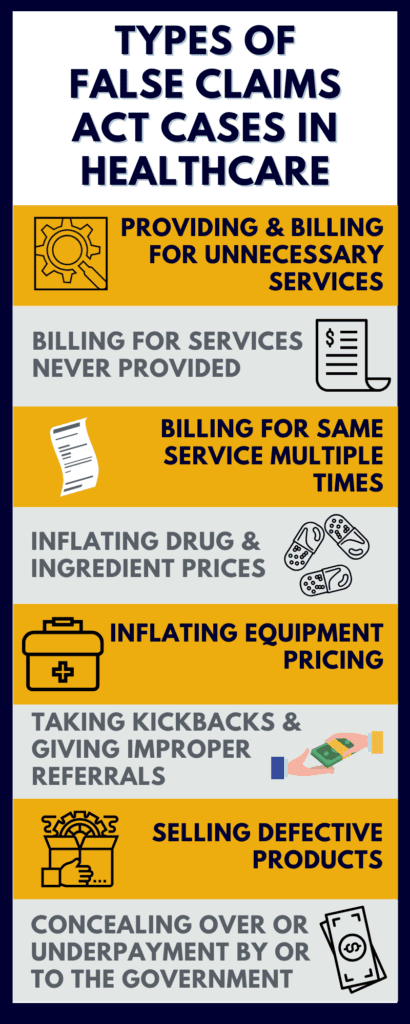The False Claims Act (FCA) is a unique federal statute that allows the US government to recover funds from people who have defrauded it. A special provision in the FCA allows private individuals to sue on the government’s behalf and even share in the recovery. The healthcare industry accounts for the majority of FCA cases, and private individuals are involved in bringing a majority of claims.
If you work in the healthcare industry and have witnessed conduct you believe may be fraudulent, you may wonder what your options are. What Is the False Claims Act in Healthcare? How does it work? The FCA allows you, as a private individual, to prosecute fraudulent claims and help monitor the ethics of the people you work with in the healthcare industry.
FCA claims can be complicated and intimidating to file on your own. If you believe you have witnessed someone in the healthcare industry defraud the federal government, contact Shields Petitti & Zoldan, PLC.
The Purpose of the False Claims Act
The False Claims Act was first passed in 1863, designed to deter fraud committed by defense contractors in the Civil War. The FCA has evolved in the years since to broadly cover false or fraudulent claims submitted to the US government.
Preventing fraud and misuse of government funds is at the heart of the FCA. The law is also effective at recovering funds that can be returned to the government programs the money was taken from. In 2022, the US government recovered more than $2.2 billion from FCA claims.
Violating the False Claims Act
Under the FCA, the government can recover funds from any person who:
- Knowingly presents a false claim for payment or approval;
- Knowingly creates or uses a falsified record or statement;
- Knowingly fails to deliver funds owed to the government;
- Bills the government for property use without knowing whether the bill is accurate;
- Knowingly obtains public property from a government employee not authorized to sell; or
- Knowingly conceals, avoids, or decreases money owed to the government.
The word “knowingly” is key to these provisions. A person acts knowingly when they have actual knowledge of, deliberately ignore, or recklessly disregard whether something is true or false.
False Claims Act Penalties
A person who violates the FCA may be liable for a hefty fine. The FCA imposes a civil penalty that is regularly adjusted for inflation. As of the most recent adjustment, in May 2022, the civil penalty is between $12,537 and $25,076. In addition, those who violate the statute typically owe three times the amount of damages the government sustained, meaning the amount of money they defrauded the government out of. If the person reports themself and cooperates with the investigation, recovery may be only two times the government’s damages.
Bringing False Claims Act Claims
When someone violates the FCA, there are two primary ways for a case to begin: the Attorney General can sue, or an individual can sue. If an individual sues, the US government can choose to take over the case from the filer and take primary responsibility for prosecuting the claim.
The filer can remain a party in the case, even if the government takes control. However, the court can override the filer’s ability to object to the case being dismissed or a proposed settlement after a hearing. The court may also impose limitations on what the filer can do at trial.
If the government intervenes in the case, the filer is entitled to between 15% and 25% of the amount the government recovers, “depending on the extent to which the person substantially contributed to the prosecution of the action.” The filer is entitled to 25% to 30% of the settlement or award if the government does not intervene. Along with the $2.2 billion recovered, the government paid out over $488 million to individuals in 2022.
False Claims Act Whistleblower Protections
The FCA explicitly prohibits retaliation against people who report violations or assist with an FCA prosecution. If a whistleblower’s employment is affected because of their FCA claim or assistance provided in an FCA investigation, they are entitled to:
- Reinstatement at the same seniority status,
- Two times back pay,
- Interest on back pay,
- Litigation costs, and
- Reasonable attorney fees.
Alongside the amount the filer can recover, this protection encourages whistleblowers to come forward with any suspicions about false claims. These robust provisions help the FCA achieve its purposes, allowing those in the best position to know that fraud has occurred to fight to protect their industry.
The False Claims Act and Healthcare
In recent years, the most common FCA claims have been related to healthcare fraud. Over $1.7 billion of the government’s $2.2 billion recovery in 2022 came from the healthcare industry, amounting to approximately 77% of the total recovery. These cases ran the gamut, including claims against:
- Drug manufacturers,
- Medical device manufacturers,
- Medical equipment manufacturers,
- Home health and managed care providers,
- Hospitals,
- Pharmacies,
- Hospice organizations, and
- Individual physicians.
The fraud involved often relates to federal programs like Medicare and Medicaid, and recovered funds are returned to support those programs.
Types of False Claims Act Cases

Frequent types of False Claims Act cases in the healthcare industry include:
- Providing and billing for unnecessary services,
- Billing for services that were never provided,
- Billing for the same service multiple times,
- Inflating drug and ingredient pricing,
- Inflating equipment pricing,
- Taking kickbacks and giving improper referrals,
- Selling defective equipment and products, and
- Concealing overpayment by the government and underpayment to the government.
Most of these frauds are easy to identify. However, a couple of common healthcare frauds involve the manual the healthcare industry uses to define how services should be billed, which may be easier to conceal. Two common ways of exploiting the manual are “upcoding” and “unbundling.”
When they upcode, the healthcare provider claims to have provided a different service than they did or that the provided service took longer than it did. The provider bills at the more expensive code rate, inconsistent with the services provided.
Unbundling involves services that are supposed to be billed together under the manual. When a healthcare provider unbundles services, they bill separately for services meant to be billed together.
There are other clever ways to defraud the government in the healthcare system. If you have witnessed behavior you believe is improper, speak with an attorney to discuss whether what you witnessed may fall under the FCA.
Contact Shields Petitti & Zoldan, PLC
If you have knowledge about someone defrauding the federal government or you were retaliated against for reporting fraud, contact Shield Petitti & Zoldan, PLC, today. Our experienced attorneys can guide you through filing an FCA claim and protect you if your employer punishes you for shining a light on their fraud.


